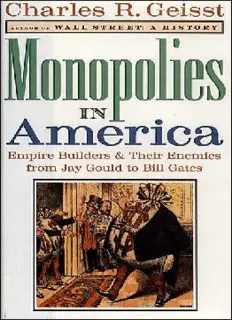
Monopolies in America : Empire Builders and Their Enemies from Jay Gould to Bill Gates PDF
Preview Monopolies in America : Empire Builders and Their Enemies from Jay Gould to Bill Gates
MONOPOLIES in AMERICA (cid:1) books by charles r.geisst Wall Street:A History 100Years ofWall Street Exchange Rate Chaos:Twenty-five Years of Finance and Consumer Democracy Investment Banking in the Financial System Entrepot Capitalism:Foreign Investment and the American Dream in the Twentieth Century Visionary Capitalism:Financial Markets and the American Dream in the Twentieth Century The Political Thought of John Milton A Guide to Financial Institutions A Guide to the Financial Markets Raising International Capital:International Bond Markets and the European Institutions Financial Futures Markets (cowritten with Brendan Brown) MONOPOLIES in AMERICA (cid:2) Empire Builders and Their Enemies from Jay Gould to Bill Gates (cid:1) charles r. geisst 1 2000 1 Oxford New York Athens Auckland Bangkok Bogotá Buenos Aires Calcutta Cape Town Chennai Dar es Salaam Delhi Florence Hong Kong Istanbul Karachi Kuala Lumpur Madrid Melbourne Mexico City Mumbai Nairobi Paris São Paulo Singapore Taipei Tokyo Toronto Warsaw and associated companies in Berlin Ibadan Copyright © 2000 by Charles R.Geisst Published by Oxford University Press,Inc. 198 Madison Avenue,New York,New York 10016 Oxford is a registered trademark of Oxford University Press,Inc. All rights reserved.No part of this publication may be reproduced,stored in a retrieval system,or transmitted, in any form or by any means,electronic,mechanical, photocopying,recording,or otherwise,without the prior permission of Oxford University Press. Library of Congress Cataloging-in-Publication Data Geisst,Charles R. Monopolies in America : Empire builders and their enemies from Jay Gould to Bill Gates / Charles R.Geisst. p. cm. Includes bibliographical references and index. ISBN 0-19-512301-8 1. Monopolies—United States—History. 2. Big business—United States—History. I. Title. HD2757.2.G45 2000 338.8'2'0973—dc21 99-14340 135798642 Printed in the United States of America on acid-free paper For Meg, a chip off the old writer’s block This page intentionally left blank contents Preface ix Introduction 1 1 The “Monopolist Menace” (1860–1890) 11 2 “Good”and “Bad”Trusts (1890–1920) 47 3 Looking the Other Way (1920–1930) 92 4 Collapsing Empires (1930–1940) 126 5 Concentrating on Fascism (1940–1953) 167 6 Déjà Vu (1954–1969) 203 7 Bearing Down (1970–1982) 247 8 Good-bye Antitrust (1983–1999) 282 Notes 321 Bibliography 333 Index 341 This page intentionally left blank preface The history of monopolies in America is relatively short but manages to encompass most of the important developments in industry, Wall Street, and political thinking over the last 130 years. Within that entire time,no one single history has ever been written touching upon the constant tug-of-war that developed between Washington and corporate America. Since the days of the nineteenth-century industrialists, bigness in industry and the role of government in curbing it have added many col- orful personalities and strong ideologues to the overarching debate about the nature of the American experiment and the attempts at controlling free market capitalism.Many of the original questions are still raised today and have a strange aura of déjà vu surrounding them. In the immediate post–Civil War years, concern over the spread of the railways and their attempts to consolidate were widespread.John D.Rockefeller’s dominance of the oil market and Carnegie’s tight grip over the steel industry all have been replayed in one form or other within the last decade.In many cases the corporate names involved in these battles have remained the same,as ix
